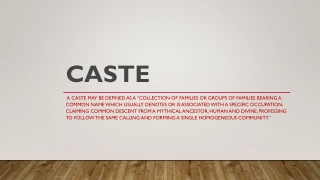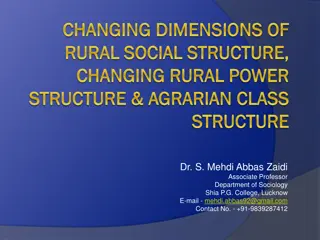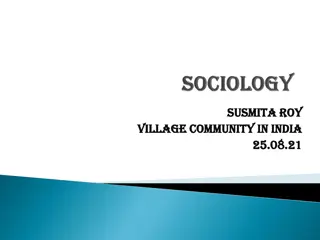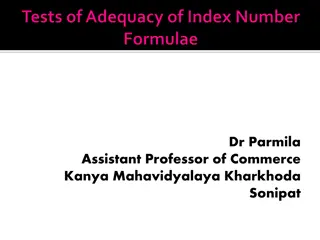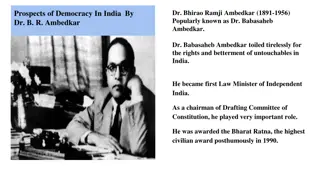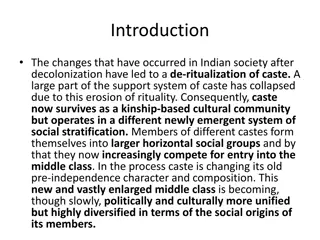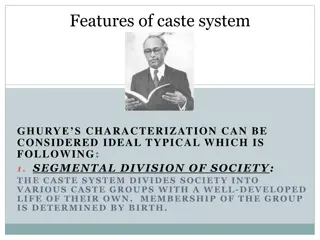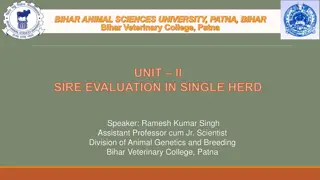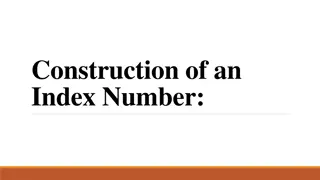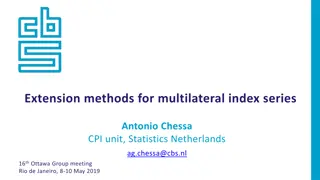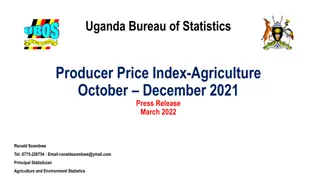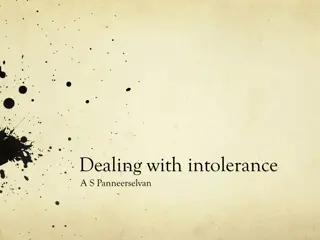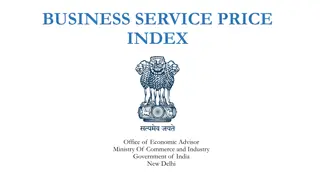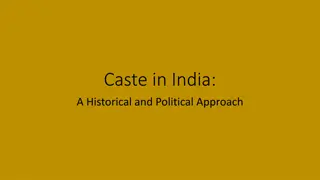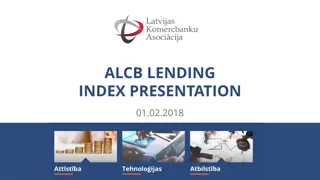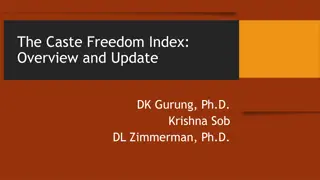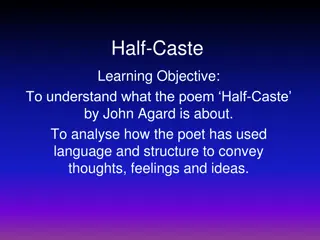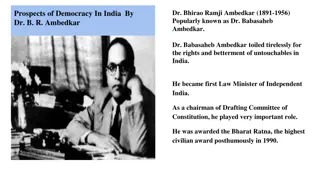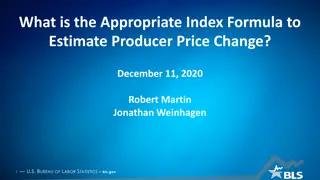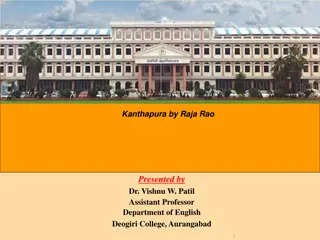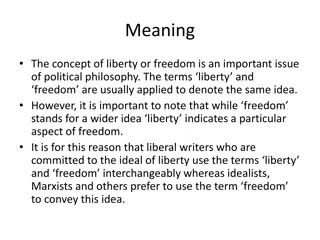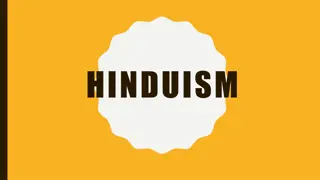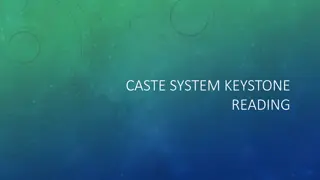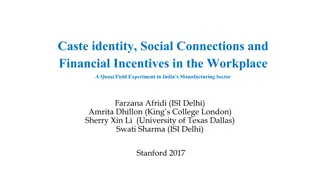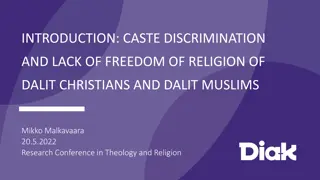Overview of Caste System in India
The caste system in India is a social structure defined by hereditary groups, each with specific occupations, rules, and traditions. Membership is based on birth, leading to a rigid hierarchy and limited mobility between castes. Endogamy, occupation, commensality, and purity are key features that sh
0 views • 17 slides
Maqasid al-Shariah-Based Performance Evaluation Index for Islamic Social Finance Institutions
This study focuses on developing a performance evaluation index for Islamic social finance institutions (ISFIs) based on Maqasid al-Shariah to better measure their performance beyond just financial aspects. The aim is to analyze how far ISFIs have accomplished Maqasid during their operations through
1 views • 22 slides
Changing Dimensions of Rural Social Structure in India
Rural social institutions in India have deep historical roots, encompassing family, kinship, caste, class, and village structures. This complexity reflects a wide range of social norms, values, roles, and obligations. Changes in the caste system and the practice of jajmani are also highlighted, show
2 views • 21 slides
Advocating Together for Academic Freedom - Importance and Principles
Advocating for academic freedom is crucial for the advancement of knowledge and quality education. The American Association of University Professors (AAUP) champions academic freedom, shared governance, and economic security for faculty members. The 1940 Joint AAUP/AAC&U Statement of Principles on A
4 views • 14 slides
Iravati Karve - Renowned Anthropologist and Sociologist
Iravati Karve (1905-1970) was a distinguished anthropologist, sociologist, educationist, and writer known for her work on kinship, Indian culture, and the Mahabharata. Through her major works and analysis of kinship organization in India, Karve made significant contributions to understanding regiona
2 views • 14 slides
Academic Freedom and Shared Governance Advocacy at UT Austin
Professors Pauline Strong, Brian Evans, and Andrea Gore lead the advocacy chapter at UT Austin, promoting academic freedom and shared governance. The American Association of University Professors (AAUP) plays a vital role in advancing these principles, supporting over 45,000 members. Principles of a
3 views • 12 slides
Panel Discussion on Academic Freedom
Academic freedom is a crucial aspect of higher education, enabling teachers to innovate, explore diverse viewpoints, and facilitate critical thinking. Organizations like AAUP and AAC&U advocate for shared governance and economic security to uphold academic freedom. The 1940 joint statement highlight
4 views • 8 slides
How to apply for a Community Certificate in Tamil Nadu
A community certificate is a document serving as proof that an individual belongs to a specific category or caste. The main reserved categories in the country are Scheduled Caste (SC), Scheduled Tribes (ST), and Other Backward Classes (OBC). This certificate can be applied in the E-Sevai portal.\nTo
3 views • 5 slides
BC Caste population as per Ambasankar Commission in India
In India, the term \u201cBackward Classes\u201c(BC) refers to socially and educationally Backward groups. In India, they come to OBC at the National level.\nBC population Count as per Ambasankar Commission:\nNote: The Following are the Communities that are in the Central Government list of \u201cOBC
6 views • 5 slides
MBC Caste population as per Ambasankar Commission in India.
MBC in the Indian context typically refers to \u201cMost Backward Classes.\u201d This is a category used in some Indian states to identify communities that are considered socially and educationally Backward.\nMBC population Count as per Ambasankar Commission\nNote: The Following are the Communities
3 views • 5 slides
Guidelines for Upholding Rights of LGBTQ
In light of evolving societal norms and the imperative to safeguard the rights and dignity of LGBTQ individuals and inter-faith\/inter-caste couples, the Supreme Court has given guidelines for the handling of habeas corpus petitions and petitions for police protection.\nBackground:\nRecent instance
9 views • 4 slides
How to apply for a Community Certificate in Tamil Nadu
A community certificate is a document serving as proof that an individual belongs to a specific category or caste. The main reserved categories in the country are Scheduled Caste (SC), Scheduled Tribes (ST), and Other Backward Classes (OBC). This certificate can be applied in the E-Sevai portal.\nDo
6 views • 5 slides
How to achieve financial freedom in 5 years
Welcome to the Financial Freedom Challenge!\nAre you ready to take control of your financial future and unlock the door to lasting prosperity? Join us on a journey toward financial freedom like no other.\nWhat is the Financial Freedom Challenge?\nThe Financial Freedom Challenge is a transformative p
0 views • 9 slides
how to get Inter caste Marriage Certificate in Tamil Nadu
other spouse is from a Non-Scheduled Caste. This type of marriage often requires special considerations and documentation due to the different social categories of the spouses.\\nDocuments Needed:-\\nTo request an Inter-caste Marriage Certificate in Tamil Nadu, you must provide the following documen
5 views • 5 slides
Socio-Cultural Features of Village Community in India
The traditional village community in India was historically self-sufficient, with its own production and consumption units. Over time, changes have led to increased interactions among villages, diminishing self-sufficiency. Factors like multi-caste populations, markets, pilgrimages, and pilgrimages
3 views • 18 slides
Understanding Time Reversal Test in Price Index Formulas
In the realm of price index formulas, the Time Reversal Test (TRT) plays a crucial role in determining the applicability of various index calculation methods. Professor Fisher introduces tests like TRT, FRT, and Circular Test to gauge formula efficiency. TRT demands that the calculated index remains
1 views • 17 slides
Challenges of Caste System and Democracy in Indian Society
Dr. B.R. Ambedkar discusses the prospects of democracy in India, highlighting the challenges posed by the caste system. He emphasizes the need for true societal unity and cooperation to achieve democracy beyond a mere form of government. The Caste system's deep-rooted inequality and lack of shared e
0 views • 10 slides
Evolution of Caste in Post-Colonial Indian Society
Changes in Indian society post decolonization have led to the de-ritualization of caste, resulting in a shift towards a kinship-based cultural community operating in a new system of social stratification. Secularization of caste has detached it from ritual hierarchy and aligned it with competitive d
5 views • 10 slides
Features of Caste System: Ghurye's Characterization
The caste system, as characterized by Ghurye, features segmental division of society determined by birth, hierarchy based on purity, restrictions on feeding and social intercourse, civil and religious privileges/disabilities, lack of occupational choice, and severe restrictions on inter-caste marria
2 views • 6 slides
Understanding Sire Evaluation Methods in Animal Genetics
Sire evaluation plays a crucial role in determining genetic worth and breeding value in animal genetics. Various methods such as Sire Index, Daughter Average Index, and Equiparent Index are used to assess sires for genetic superiority. Biasness in evaluation due to environmental factors and contempo
4 views • 11 slides
Exploring Methods of Constructing Index Numbers
Various methods of constructing index numbers, such as un-weighted index, simple aggregate method, and simple average of price relatives method, are explained in detail. These methods play a crucial role in analyzing price changes over time and comparing different economic indicators. Each method of
0 views • 6 slides
Understanding H-Index and I10-Index in Scientific Research
The h-index and i10-index are important metrics in evaluating a researcher's impact and productivity in scientific research. The h-index indicates the number of publications with at least the same number of citations, while the i10-index counts the number of publications with at least 10 citations.
0 views • 13 slides
Extension Methods for Multilateral Index Series: A Comparative Study by Antonio Chessa
This study by Antonio Chessa delves into the characterization of extension methods for multilateral index series, highlighting the impact of various factors such as product definition, index formula, weighting schemes, and length of time windows on the index. It addresses the challenges of revising
0 views • 33 slides
Uganda Bureau of Statistics Producer Price Index - Agriculture Overview
The Uganda Bureau of Statistics (UBOS) produces and disseminates the Producer Price Index Agriculture to show the farm-gate prices received by farmers for primary agricultural products. The index is used by various stakeholders for policy-making and decision-making purposes. It covers key agricultur
2 views • 26 slides
Dealing with Intolerance: Challenges Faced by Journalists in India
India, a country of contradictions, struggles with press freedom as journalists face threats and violence. With a backdrop of incidents like the killing of Gauri Lankesh, issues of gender, caste, and hyper-nationalism contribute to a hostile environment for the media. Social media amplifies these ch
0 views • 15 slides
Development of Business Service Price Index in India
The Business Service Price Index is being developed in India to include services in the Wholesale Price Index, covering key sectors like Railways, Air Transport, Banking, and more. The proposed index framework aims to integrate various service price indices. Challenges include capturing dynamic rail
0 views • 22 slides
Understanding Caste in India: A Historical and Political Perspective
Caste in India is a complex system deeply intertwined with religion, history, and society. It is a hierarchical structure that dictates social organization, power dynamics, and economic relationships. The system, comprising varna and jatis, perpetuates inequality and marginalization, with long-stand
0 views • 22 slides
ALCB Lending Index Presentation & Methodology Overview
Explore the ALCB Lending Index Presentation held on 01.02.2018, including methodology, results, and discussions on lending for economic growth. Discover the index development process, methodology, and factors impacting banks' ability and desire to lend, as well as borrowers' ability and desire to bo
0 views • 14 slides
Understanding the Caste Freedom Index in Nepal
Delve into the Caste Freedom Index in Nepal, highlighting the current status of Dalits and the need for such an index. Learn about the caste system's power and organization in Nepalese society, and why this index is crucial in combating caste-based discrimination. Explore historical perspectives and
0 views • 20 slides
Understanding John Agard's Poem "Half-Caste
Explore the meaning and themes of John Agard's poem "Half-Caste," analyzing how the poet uses language and structure to convey thoughts and feelings. Delve into the origins of the term "half-caste" and its implications, as well as Agard's unique approach to humor and breaking down racial boundaries
0 views • 13 slides
Challenges of Caste System in Indian Democracy
Dr. B.R. Ambedkar highlighted the challenges of democracy in India, emphasizing the deep-rooted caste system. He explained how the caste system leads to inequality, lack of community purpose, and hinders the ideals of a democratic society. The differences between caste and class systems were also ou
0 views • 10 slides
Overview of Proposed Changes in Producer Price Index Formulas
The U.S. Bureau of Labor Statistics is considering transitioning from a modified Laspeyres formula to a geometric Young formula for elementary indexes in the Producer Price Index (PPI). This proposed change aims to enhance the accuracy and economic relevance of price measurements by utilizing a geom
0 views • 25 slides
Freedom of Speech and Freedom of Information: Understanding the Differences and Coincidences
Freedom of Speech and Freedom of Information are essential human rights that allow individuals to express thoughts and receive truthful information. While Freedom of Speech pertains to the expression of ideas through various means, Freedom of Information involves the communication and reception of a
0 views • 9 slides
Raja Rao's Kanthapura: A Tale of Tradition and Transformation
Raja Rao's novel "Kanthapura" narrates the story of a village in South India through the eyes of an old woman, Achakka. The village is divided by caste, with Brahmins holding privilege. The protagonist, Moorthy, embraces Gandhian ideals and challenges the caste system, facing excommunication. The no
0 views • 19 slides
Exploring the Concept of Freedom and Liberty in Political Philosophy
The concept of liberty and freedom holds significant importance in political philosophy. While often used interchangeably, liberty signifies a specific aspect of freedom. Freedom encompasses the quality and condition of human beings, distinguishing them from other living beings. It involves the cont
0 views • 13 slides
Insights into Hinduism: Traditions, Beliefs, and Society
Hinduism, an ancient religion, developed by the Aryans in India, encompasses a diverse pantheon of gods, beliefs in reincarnation and karma, and a structured caste system. The worship of numerous gods reflects the monotheistic belief in Brahma. Social aspects, such as the caste system, play a signif
0 views • 17 slides
Understanding the Caste System through a Dalit Perspective
Explore the author's purpose in discussing the life of Dalits, the transformation they have undergone, and the challenges they still face within the traditional caste system. Discover insights into the portrayal of Dalits in society, the role of statistics in highlighting their realities, and the on
0 views • 8 slides
Caste Identity and Social Connections in Indian Manufacturing Sector
The study explores the impact of caste identity and social networks on productivity in Indian garment factories. It highlights the persistence of social and economic inequality based on caste, affecting poverty rates and income differentials. The research delves into how caste-based recruitment and
0 views • 31 slides
Caste Discrimination and Lack of Religious Freedom Among Dalit Christians and Dalit Muslims
This research conference delves into the issues of caste discrimination and limited freedom of religion faced by Dalit Christians and Dalit Muslims in India. It explores the historical and social context, theological influences, and the significance of counter theology in addressing these systemic i
0 views • 20 slides
June 2023 Price and Supply Risk Forecasting Report
Arthurnelle Wade, Life Science Commodity Manager at UCOP, presents key data on the Consumer Price Index trends, including food, medical care services, and goods. The report also highlights changes in gasoline prices, delivery services, and public transportation costs across various regions. Addition
0 views • 11 slides
